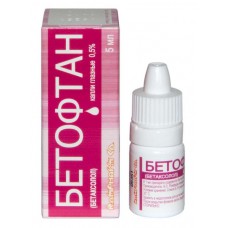Expiration date: 03/2026
The composition and form of issue:
Eye drops, 1 ml contains active substance:
betaxolol hydrochloride equivalent to betaxolol 5 mg
excipients: sodium hydrogen phosphate dodecahydrate sodium dihydrogen phosphate monohydrate sodium chloride disodium edetate dihydrate benzalkonium chloride purified water
in white plastic vials-droppers, closed with a polymer cap with safety ring, 5 ml in a cardboard pack 1 bottle.
Description pharmaceutical form:
Transparent colorless or light yellow with brownish tint solution.
Pharmacokinetics:
Betaxolol is highly lipophilic, with the result that it penetrates through the cornea into the anterior chamber of the eye, Cmax in the front chamber is defined within 20 minutes after instillation. When local applications low systemic absorption, concentration in plasma below the detection threshold (2 ng/ml).
Connection with the plasma protein — 50%. T1/2 is 14-22 hours Excreted by the kidneys (15% unchanged). The permeability of the BBB and placental barrier — low, the secretion of breast milk is insignificant.
Description pharmacological action:
Betaxolol — selective &beta1-blocker without intrinsic sympathomimetic activity. It has no membrane stabilizing (local anesthetic) activity.
The local application betaxolol reduces both elevated and normal intraocular pressure, due to reduced production of intraocular fluid. The onset of antihypertensive effect is usually observed within 30 minutes after using the drug, and the maximum reduction in IOP occurs approximately 2 h After a single installation, the effect on the IOP is maintained for 12 h Betaxolol in comparison with other &beta-blockers, does not cause a reduction of blood flow in the optic nerve.
Betaxolol does not cause miosis, accommodation spasm, night blindness (in contrast to miotikov).
Indications:
- ocular hypertension
- chronic open-angle form of glaucoma
- angle-closure glaucoma (in combination with miotikami).
Contraindications:
- hypersensitivity to the drug
- sinus bradycardia
- atrioventricular block II and III degree
- syndrome sick sinus
- children up to age 18 years (due to the lack of data on efficacy and safety).
Caution: diabetes mellitus thyrotoxicosis simultaneous reception of oral &beta-blockers Raynaud's syndrome, pheochromocytoma, bronchial asthma chronic obstructive bronchitis AV blockade of I degree heart failure.
Application of pregnancy and breast-feeding:
The use of the drug during pregnancy and lactation (breastfeeding) is possible only in the case when expected benefit for mother exceeds potential risk for fetus or child.
Side effects:
Local: short-term discomfort in the eyes after instillation, lacrimation, in some cases, the reduction of sensitivity of the cornea, redness of the eyes, keratitis, photophobia, anisocoria, blurred vision, itching, dryness of eye, allergic reactions.
Systemic: side effects are rare.
CNS: dizziness, nausea, drowsiness, insomnia, headache, depression, increased symptoms of myasthenia gravis.
From the CCC: bradycardia, impaired cardiac conduction and heart failure.
The respiratory system: dyspnea, bronchospasm, bronchial asthma, respiratory failure.
Drug interactions:
While the use of the drug Betatan and adrenalin solution for ophthalmic use in some cases, the development of mydriasis.
In applying the drug Beloften in combination with drugs, depleting stocks of catecholamines (such as reserpine), may experience increased effects such as decreased blood pressure and bradycardia.
While the use of the drug Betatan and &beta-blockers for intake increases the risk of side effects (local and systemic) due to additive effects.
Caution must be exercised in a joint application of the drug Betatan and adrenergic psychotropic drugs due to possible increase in their actions.
When concomitant administration of muscle relaxants and hypoglycemic agents may experience increased their actions.
In a joint application with sympathomimetics — increased their vasoconstrictor effect.
If necessary, can be used in combination with other topical ophthalmic products. In this case, the interval between their use shall be not less than 10 min.
Method of application and dose:
Local.
1-2 drops in the conjunctival SAC of the eye 2 times a day. In some patients, stabilization of intraocular pressure occurs within a few weeks, so it is recommended to control intraocular pressure during the first month of treatment.
If the required level of intraocular pressure is not achieved with monotherapy Bettana should designate additional therapy.
Overdose:
Currently, the cases of drug overdose of Betoplan was not reported.
In case of contact with eyes, excessive amount of the drug, rinse the eye with warm water.
Overdose &beta1-blockers may occur hypotension, bradycardia, and congestive heart failure.
Treatment is symptomatic.
Precautions:
Beloften contains the preservative benzalkonium chloride which may be adsorbed by soft contact lenses and cause damage to eye tissue. Therefore, patients wearing soft contact lenses should remove them before using drops and set back no earlier than 20 minutes after instillation.
To avoid contamination of the pipette should not touch the eye during backfilling.
Diabetes. &beta-blockers should be used with caution in patients prone to hypoglycemia, because these drugs can mask symptoms of acute hypoglycemia.
Thyrotoxicosis. &beta-blockers may mask some symptoms of hyperthyroidism (e.g. tachycardia). In patients with suspected thyrotoxicosis should not be abruptly canceled &beta-adrenergic blockers, as this may cause increased symptoms.
Myasthenia gravis. &beta-blockers can cause symptoms similar to those of myasthenia gravis (e.g. diplopia, ptosis, generalized weakness).
Surgery. Before planned operation &beta-blockers should be gradually (not simultaneously!) cancelled for 48 h before General anesthesia, because during General anesthesia, they can reduce the sensitivity of the myocardium to sympathetic stimulation necessary for the heart.
Pulmonology. Use caution when assigning &beta-blockers for patients with severely reduced function of the respiratory system. Despite the fact that clinical studies have shown no effect betaxolol on respiratory function, one should not exclude the possibility of hypersensitivity to the drug.
The risk of anaphylactic reactions. Patients receiving &beta-blockers, may have a history utopia or anaphylactic reactions. In the case of repeated reactions, such patients may be insensitive to the usual doses of epinephrine required for the relief of anaphylaxis.
When instillation of the drug may enter the systemic circulation. Therefore, you may experience the same side effects as the on/in and parenteral appointment &beta-blockers.
Beloften has a minimal effect on BP and HR. However, care should be taken when assigning its patients with AV blockade of I degree or heart failure. Treatment should be discontinued at the first signs of decompensation of SSS.
Effects on ability to drive or to perform work requiring high speed physical and mental reactions
Patients who have after the installation of the drug temporarily reduces the clarity of vision, it is not recommended to engage in activities, require increased attention and response to restore it.
Expiration date:
After opening 28 days.


